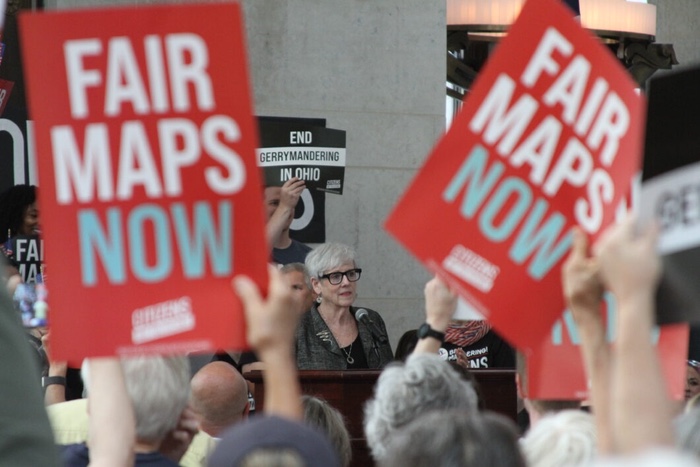
Since December, a group called Citizens Not Politicians has been gathering signatures to place an issue on the Ohio ballot that would upend our state’s political climate in a positive way, restoring democracy and the voice of its people. The deadline is to turn them in is July 3, and on Monday July 1, activists and volunteers gathered in Columbus to deliver their petitions — with 731,306 signatures — to the Secretary of State’s office. Four trucks carried 810 boxes of petitions. It included signatures from all 88 of Ohio’s counties and made the 5% threshold required from 44 counties in 57 counties. Since just valid 413, 487 signatures are required for the issue to make the ballot, it’s a slam dunk we’ll be voting on it in November.
Headlining a rally at noon in the Statehouse Atrium was retired Republican Supreme Court Justice Maureen O’Connor, one of the movement’s leaders, who became a key voice for redistricting reform when, as Chief Justice of the Ohio Supreme Court, she voted against her fellow Republicans on the 2020 redistricting commission when they drew legislative and congressional maps that were blatantly unconstitutional. Upon retirement she joined with leaders of both parties as well as independents to brainstorm ways to restore fair redistricting and democracy to Ohio.
“This is our house, the people’s house, and with today’s signature turn-in, we move one giant step closer to ensuring that the citizens decide who serves here, not the politicians who just scheme and rig the game to stay in power,” she said today “This constitutional amendment will restore power to Ohio citizens and take it away from the self-serving politicians and their lobbyist friends and big-money donors.”

The issue would replace the politicians who currently draw the districts with a fifteen-member commission of five Republicans, five Democrats and five independents from different parts of the state, reflecting the typical voter breakdown. Members can’t be elected officials or former officials, political party staff members or lobbyists.
While the issue has support from grassroots Republicans and even prominent ones such as O’Connor, those in the legislature and state offices who have benefited from gerrymandering would lose a huge amount of unearned power if it passes. Currently, the GOP controls 70% of the state House and 80% of the state Senate as well as all the statewide nonjudicial offices, while typically between 52-54% of Ohioans vote for a Republican. That means alternate opinions and the voices of citizens aren’t even considered, as the legislature passes wildly unpopular legislation with no possible consequences. Well, unless they’re caught accepting more than $60 million in bribes to bail out First Energy; former Ohio House speaker Larry Householder is in prison for that. But without the extreme political tilt of the legislature, that might not have happened.
While Citizens not Politicians says that currently there are no groups who have announced opposition to the issue, we can expect big dark money to flood the state with misleading advertising. And while the Republicans in the legislature have showboated their concern for “foreign” money, it’s far more likely this money will come from billionaires in places such as Illinois. (In fact, Illinois billionaire Richard Uihlein poured money into last August’s illegal election to try to make it harder to pass ballot issues such as this one, an effort that fortunately failed.) And I wouldn’t count out secretary of state Frank LaRose trying to write misleading ballot language.
Passing this constitutional amendment is is one of the most important things we can do for Ohio. With more competitive districts that could reduce the GOP majority in the legislature by 20 points or more, endless hearings on drag queen story hours and which bathrooms trans people can use would likely become a thing of the past as the legislature focused on things most Ohioans really care about: equitable school funding, access to health care, attracting jobs, tackling the opioid crisis, feeding kids, reducing the maternal and infant mortality rate among minorities, and stopping the flood of guns which drive crime.
Read more about the issue here and find ways to get involved.